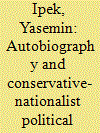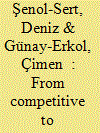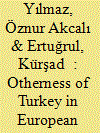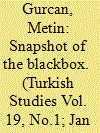|
|
|
Sort Order |
|
|
|
Items / Page
|
|
|
|
|
|
|
| Srl | Item |
| 1 |
ID:
158103


|
|
|
|
|
| Summary/Abstract |
This article examines how autobiography-writing evolved into a political space for Kazım Karabekir, Ali Fuat Cebesoy and Rauf Orbay, three major leaders of the Turkish War of Independence and the Progressive Republican Party. This article demonstrates that their autobiographies articulate a position of political opposition. This is a novel addition to academic literature that has so far presented these figures as early representatives of peripheral dissent against the Republic, or overstressed their Unionist legacy. The autobiographical politics of Karabekir, Cebesoy and Orbay extensively builds on moralizing discourses that contrast their own heroic accomplishments against the rise of a circle of military-bureaucratic elites – etraf – surrounding Mustafa Kemal Atatürk. Through textual analysis, this article maintains that the moralizing discourses they use pose a peculiar blend of nationalism and conservatism – an elitist conservative nationalism that homogenizes political differences and ideological splits. The analysis contributes to the study of Early Republican oppositional politics and conservative political imaginary in Turkey.
|
|
|
|
|
|
|
|
|
|
|
|
|
|
|
|
| 2 |
ID:
158098


|
|
|
|
|
| Summary/Abstract |
Existing research on the relationship between political trust and political participation has generated mixed results. In pursuit of a better explanation of this relationship, we argue that trust in institutions has varying effects on participation for minority and majority groups. In this paper, we analyze Turkish and minority attitudes toward Turkish institutions. We find strong support that trust in institutions affects majority and minority political participation differently. These results highlight the divergent processes at work in the relationships between political trust and political participation across majority and minority citizens in Turkey due to their varied experiences with these institutions. Some of our most interesting findings show that minorities, unlike citizens from the majority group who have higher trust in police, are more likely to protest, and minorities with trust in political parties are actually less likely to join these parties. We explain these surprising findings within the context of Turkey’s post-armed conflict political context.
|
|
|
|
|
|
|
|
|
|
|
|
|
|
|
|
| 3 |
ID:
158102


|
|
|
|
|
| Summary/Abstract |
Recent research shows that Turkish society is very polarized and that different identities and ideological perspectives are in constant struggle with each other. In a multicultural society such as Turkey’s, the question of how to think about the relationship between different social groups’ histories of victimization becomes crucial. Following Michael Rothberg’s conceptualization of multi-directional memory – beyond competitive memory, this article presents an archive for comparative work through a data set of novels on the military coups in Turkey. The major argument here is that while these novels are promoting the idea of competitive memory as a zero-sum game, if it is looked at more closely, there are traces of multi-directionality, of ongoing negotiation, cross-referencing, and borrowing. Doing so, it is argued, would help to reframe justice in the society, where different victimizations are not competing with each other, but start to talk to each other. This article is an attempt to create a literary tool of comparison on different stories of victimization as a first step towards transitional justice in a polarized society.
|
|
|
|
|
|
|
|
|
|
|
|
|
|
|
|
| 4 |
ID:
158099


|
|
|
|
|
| Summary/Abstract |
This paper discusses how Turkey’s otherness to European identity, as represented by the European Union (EU), was turned into an asset during the beginning of the AKP rule. To the extent that the AKP represented the Islamic cultural other against both the secular establishment of Turkey and the EU, its promise to fulfill the Copenhagen political criteria and adopt EU norms and standards provided a possibility of ‘a model’ for the EU. This was the promise of a self-transforming cultural other becoming a part of the EU normative order and representing this system in its region. In the period between 2002 and 2005, there was a compromise on Turkey’s projected identity between the EU and the AKP. Yet this early promise and the ensuing compromise could not be sustained and realized in the following phases of the AKP rule. First stagnation between 2005 and 2010 and then a break wasted this promising new beginning.
|
|
|
|
|
|
|
|
|
|
|
|
|
|
|
|
| 5 |
ID:
158100


|
|
|
|
|
| Summary/Abstract |
This article surveys the political economy of coups in Turkey, examining both their economic causes and the economic consequences they seem to generate. It reminds that whether coups had a negative causal effect on Turkish economic growth remains to be compellingly shown. It highlights that military intervention attempts tend to follow already troublesome economic times: Before the 1960 and 1980 coups, 1971 and 2007 memoranda, as well as the failed coup attempts in 1962 and 2016, economic growth slowed down compared to a previous five-year period. This is in line with global trends about coups becoming likely following slower economic growth. Furthermore, students of Turkish politics have noticed a more specific economic policy-making pattern centering on currency devaluation during episodes preceding coups. This article discusses whether such a pattern may be taken as a ‘local theory’ of Turkish coups while discussing its limitations.
|
|
|
|
|
|
|
|
|
|
|
|
|
|
|
|
| 6 |
ID:
158101


|
|
|
|
|
| Summary/Abstract |
This paper aims at opening the blackbox of the Turkish military by presenting the findings of a survey conducted among 1401 officers in May–August 2015. The findings, which could be defined as the snapshot of the Turkish military’s officer corps views, show that, as the ranks decrease, there are some major trends influencing the officer corps. These include heterogenization and diversification of opinions from collectivist to an individualist understanding of life, from an elitist to an egalitarian view of society, and change from value-centric service to a focus on financial goals and career opportunities. The findings also indicate that the Turkish Army, Air Force and Navy’s organizational cultures are dissimilar regarding their stance towards military transformation, organizational restructuring and some socio-political issues such as the extent of secularist sentiment, religiosity and political orientations.
|
|
|
|
|
|
|
|
|
|
|
|
|
|
|
|
| 7 |
ID:
158097


|
|
|
|
|
| Summary/Abstract |
In June 2016, the UK voted to leave the European Union (EU). Although many issues shaped the Brexit campaign, the question of Turkey’s quest for EU membership emerged as an unexpectedly strong factor. This article examines how this happened and how the debate evolved. It shows that those who advocated leaving the EU not only distorted the prospect of Turkish membership, they also misrepresented British support for the country’s accession. While the UK had indeed been a strong advocate of Turkey’s EU integration in the past, support for enlargement in general had declined in recent years due to increasing voter concerns over immigration. However, the policy of supporting Turkish membership could not be wholly repudiated by the government, even in the name of campaigning to stay in the EU, as this would have damaged Britain’s strategic relationship with Turkey.
|
|
|
|
|
|
|
|
|
|
|
|
|
|
|
|
|
|
|
|
|